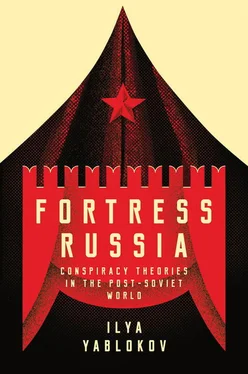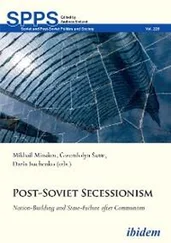This discursive division is used to stress two important ideas which are central to her work. Firstly, it accentuates the ultimate threat of US domination over Russia, and the possible consequences if Russia falls under the influence of the West. Secondly, loyalty to the USA and the Westernized ‘world elite’ helps Narochnitskaia identify an internal group of conspirators within Russia.
In her speeches Narochnitskaia has described pro-Western liberals as a group of internal conspirators who have nothing in common with the Russian nation and who are doing untold harm to Russia’s memory of its great past ( Narochnitskaia.ru, 2007a). She compares the intellectual and political elites of the present day with those of the past and praises Soviet intellectuals and Russian immigrants who fled from Russia after the revolution in 1917 but remained patriots (Narochnitskaia.ru, 2008). In this way, she promotes a national cohesion of different social and political groups, despite the differences in their political views. Even the nineteenth-century debate between Westernizers and Slavophiles is presented as a dispute between two equally patriotic groups of intellectuals who emphasized Russia’s unique position in the world (Narochnitskaia.ru, 2007c). In contrast to the political and intellectual elites of the past, current pro-Western liberal elites are described as people who neither love their own country, nor comprehend the intellectual legacy of European intellectual thought. As Narochnitskaia puts it, they hate the Russian people and Orthodoxy, and the only thing that they hold sacred is the bank accounts they have in the West (Narochnitskaia.ru, 2007d). This derogatory description is usually applied to people who oppose the Kremlin and is used to delegitimize any statements critical of Putin’s policies.
Narochnitskaia claims that the fact that the liberal opposition in Russia is Western-oriented is used by conspirators from the West to undermine Russia’s greatness from within. Referring to the collapse of the Soviet Union, Narochnitskaia claims that under the influence of external forces, ‘liberals threw away and trampled upon three hundred years of Russian history’ ( Narochnitskaia.ru, 2007b). She sees critical remarks about the Soviet past, and in particular attempts on the part of some Russian (and Western) historians to downplay Russia’s role in the Second World War, as an act of conspiracy that seeks to delegitimize the Soviet Union’s post-1945 territorial possessions. She fears that this could lead to Russia’s expulsion from international organizations and the loss of its post-war territorial possessions on the Baltic Sea, Black Sea and Pacific Ocean; this, in turn, would diminish Russia’s status as a great global power (Narochnitskaia.ru, 2009).
It can be argued that Narochnitskaia’s ideas have had a significant influence on the politics of nation-building in Russia. It is not possible to trace any direct connection between them and the Kremlin’s official nation-building policies, but her access to the presidential administration and the fact that she has held leading positions in major Kremlin-sponsored think tanks puts her in a very strong position. For instance, Narochnitskaia’s approach to Russian history stresses that all periods and events have been important for the nation: ‘We should not omit a single page from the history of the Fatherland, even those which we do not want to repeat’ (Krotkov, 2007). When Putin suggested that a single history textbook be adopted by all schools in 2013, he argued, in similar vein, that it should show respect for all ‘the pages of Russian history’ (Putin, 2013).
Narochnitskaia’s views crucially influenced the First World War commemoration held at the end of the 2000s. In her speeches and interviews, she praised the heroism of the Russian soldiers who had saved Europe, complaining that their deeds had been either forgotten or obscured both by Bolshevik propaganda and the West. She argued that Russian action in the First World War must be returned to its place in the pantheon of heroic deeds: this would link contemporary Russia with the glory of Imperial times. She insisted that subversive forces within the country and abroad were intent on destroying people’s understanding of the war as this would undermine Russia by depriving Russians of their patriotism and their trust in the Fatherland (Pleshakova and Narochnitskaia, 2009). As Vera Tolz has noted (2014), Narochnitskaia has been at the centre of commemorative events devoted to the First World War since 2009, and has attracted much attention on the part of leading politicians. In 2013, at a meeting of the Russian Military-Historical Society, Putin agreed to the creation of a monument commemorating the First World War. This led to a fully-fledged state-sponsored campaign to commemorate Russia’s role in the war. The main narratives articulated by its participants were based on concepts outlined by Narochnitskaia in the preceding years (Radio Ekho Moskvy, 2013).
Narochnitskaia’s access to the media and her academic status have allowed her to play the role of prominent spokesperson for Russian patriotic groups and to defend Russian political interests in debates with the opposition. Her case demonstrates how anti-Western conspiracy theories become an instrument of national reconciliation because they shift the blame for the breakdown of the Soviet Union from Russians themselves onto conspiring foreign enemies. This is a trick that is widely used by the Kremlin, as we shall see later.
Maksim Shevchenko:
The Battle Against Western Neo-Liberalism
Since the mid 2000s, Maksim Shevchenko has been one of the most outspoken figures in the anti-Western conspiracy discourse. Shevchenko began his media career as a journalist with Nezavisimaia gazeta , covering issues relating to religion. He also published articles about the military conflict in the North Caucasus in the 1990s and the conflict in Afghanistan at the beginning of the 2000s. From 2006, he hosted a television talk show, Judge for Yourself ( Sudite sami ) on Channel One, which began his television career and helped to establish his public profile as one of the main commentators on interethnic and interreligious relations in Russia. Twice, in 2008 and 2010, he was selected by then President Medvedev to be a member of the Public Chamber, which was created by the Kremlin in the mid 2000s to function as a forum for the discussion of issues pertaining to Russia’s ‘civil society’. Shevchenko’s participation was primarily focused on interethnic relations, and as a result he became one of the principal spokespersons for matters connected with the North Caucasus in the Russian press. In 2012, he became editor-in-chief of the website Kavkazskaia politika ( The Politics of the Caucasus ), an open forum for the discussion of issues relating to the Caucasus. Shevchenko has built a profile for himself as a leading expert in interethnic relations; this allows him to promote his views on various television talk shows and radio programmes.
Like Dugin and Narochnitskaia, Shevchenko describes Russia as a great world power, which brought European methods of administration and cultural development to new territories during the Imperial and Soviet periods. Ethnic Russians served in this process as a ‘frame for the nation’ ( kostiak natsii ) (Shevchenko, 2010). He sees the prerequisite for Russian greatness as a combination of the three ethno-religious groups: Orthodox Russians, the Turkic Muslims who inhabit large areas of Siberia, and the various ethno-religious groups of the North Caucasus (Zatulin and Shevchenko, 2012). Shevchenko insists that if any of these groups were to disappear it would destroy Russian nationhood and Russians would fall under the control of the West. Accordingly, he offers a theoretical framework for the national cohesion of the Russian Federation, which centres on the idea of territorial unity. He considers that Russia’s superiority over the nation-states of Europe is rooted in its composite quality, the inclusion of several ‘civilizations’ in one nation. This guarantees social justice and interethnic tolerance. The Caucasus itself represents a model of interethnic dialogue because it incorporates various religious and ethnic groups.
Читать дальше
Конец ознакомительного отрывка
Купить книгу












